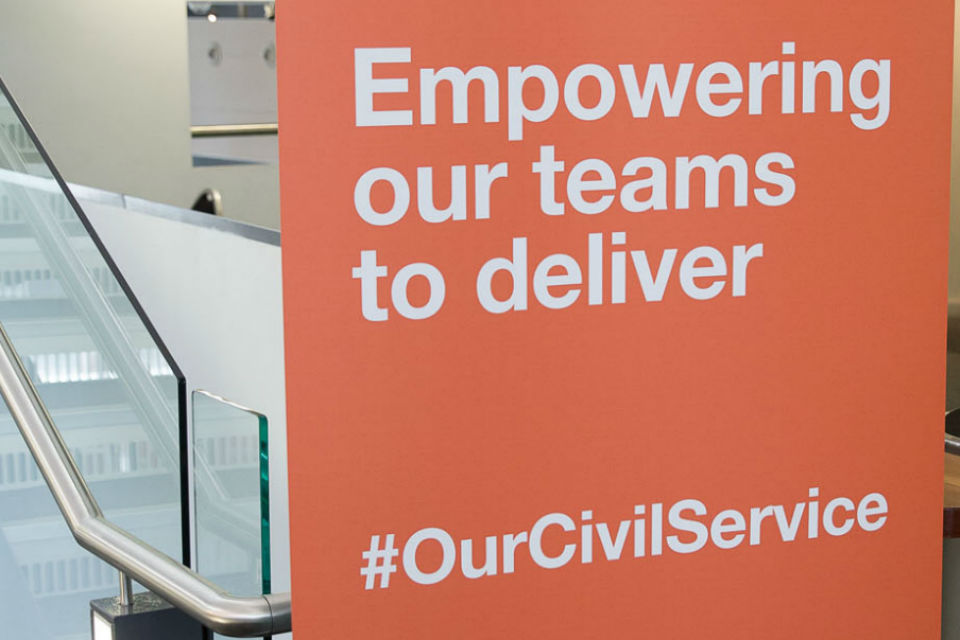 I’m obviously thrilled that DCMS achieved an employee engagement score of 66% in the 2015 People Survey. For the second year running we had the biggest gain – we’ve gone up by 15 percentage points in total over the last two years and are now fourth among Whitehall departments. And perhaps what I am most proud of is that almost 97% of our people completed the survey, so we know the result genuinely reflects how people feel about working in DCMS.
I’m obviously thrilled that DCMS achieved an employee engagement score of 66% in the 2015 People Survey. For the second year running we had the biggest gain – we’ve gone up by 15 percentage points in total over the last two years and are now fourth among Whitehall departments. And perhaps what I am most proud of is that almost 97% of our people completed the survey, so we know the result genuinely reflects how people feel about working in DCMS.
So, how has DCMS achieved the improvements we’ve seen?
Well, we have some real strengths that help. We often find ourselves talking about the disadvantages of being such a small department. However, smaller departments do tend to do better on staff engagement, so in this sense our size is a strength. Also, departments with a mission that their people feel really passionate about tend to do better. DCMS has that in spades, whether our people love working on the more traditional areas of departmental business, such as arts and museums, or on what now makes up more than half of our work, the fast-moving world of the internet, broadband, digital and telecoms.
Four key things
However, being small and interesting isn’t enough, or DCMS would have always achieved such high scores. I would pick out four key things we’ve focused on that have led to the rise in scores we’ve seen:
1. Senior visibility and openness
 We’ve made a big effort to ensure that our executive team and senior leaders are visible and accessible to staff – through things like more frequent ‘stand-ups’; observers at executive board meetings, who write about their experiences online; and Q&A at our all-staff away days. This makes it easier for people to identify with their leaders, and it offers them opportunities to challenge us, and to hear what DCMS is about and what our vision for the organisation is.
We’ve made a big effort to ensure that our executive team and senior leaders are visible and accessible to staff – through things like more frequent ‘stand-ups’; observers at executive board meetings, who write about their experiences online; and Q&A at our all-staff away days. This makes it easier for people to identify with their leaders, and it offers them opportunities to challenge us, and to hear what DCMS is about and what our vision for the organisation is.
2. Making sure people have time together away from the day job
When everyone is very pressed delivering day-to-day business, it can feel like an indulgence to set aside half a day now and then to spend time together as a leadership team, whether as Executive Board or the Senior Civil Service. Without it, however, I simply don’t think you can present yourselves as a cohesive team to the department, or look hard at what needs to be done to improve how things work. We’ve seen to it that we do set aside that time, and the People Survey results suggest that’s been really worthwhile, as it’s our scores on Leadership and Managing Change that have gone up most.
In addition – and a real advantage of being a small department – we can fit everyone who works in DCMS into one room, and do so twice a year. That gives us all a chance to reflect on what we’re here for and how we need to change to do better.
3. Prioritising internal communications
DCMS had really cut back its resource for internal communications to almost nothing in the budget reductions that the department went through after the 2012 Olympics. We’ve now grown that again, and while our team is naturally still smaller than in many places, the three people who deliver our internal comms are a brilliant bunch. They make departmental communications engaging and unstuffy; blogs and intranet articles are a must-read; and they are always finding new and exciting ways to get the department involved in the issues that affect them.
Together with HR the 97% response rate on the People Survey is a brilliant example of what a stronger corporate core can do. I think this has done a huge amount to ensure people in the department know that they are cared about them, have the information they need and are listened to.
4. Investing in people
 Rightly, DCMS had looked to make its corporate functions as streamlined as possible when it reduced its staff by 50%. However, ultimately, it doesn’t help policy and delivery teams do their jobs if they can’t get the right HR support and the right learning and development. So, through a rigorous process of resource prioritisation and looking hard at what activities were essential, we strengthened our HR team, created strong HR partnerships within the business and launched the DCMS Academy, complete with a freshers’ week!
Rightly, DCMS had looked to make its corporate functions as streamlined as possible when it reduced its staff by 50%. However, ultimately, it doesn’t help policy and delivery teams do their jobs if they can’t get the right HR support and the right learning and development. So, through a rigorous process of resource prioritisation and looking hard at what activities were essential, we strengthened our HR team, created strong HR partnerships within the business and launched the DCMS Academy, complete with a freshers’ week!
We believe this investment in HR and our people works for small departments who still need a core team to work on pay, L&D, performance management, casework and to business- partner the groups – let alone support our arms length bodies, who have 30,000 staff between them and often need help and advice from DCMS HR.
We can do better
Of course, the results also reflect the individual, every-day efforts of all our people to work well together, collaborate and deliver. I’m grateful to them for making DCMS the terrific place to work that it is.
I also think we can do even better. After all, 66% engagement still means a third of DCMS staff don’t feel very engaged, so it isn’t good enough. In particular, we need to work on management as well as leadership, and ensure more consistency across the different parts of the department. Our Executive Board will be setting itself a goal to be at or above the Civil Service High Performers benchmark on every measure next year. That won’t be easy, but we’ll do all we can.
So, I hope Treasury and DFID are watching - DCMS is on its way further up!
